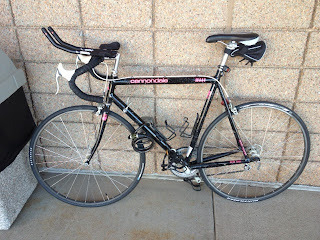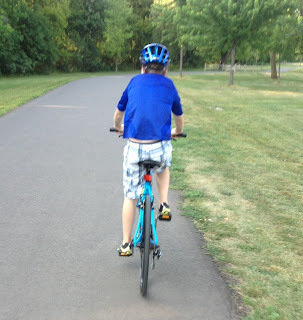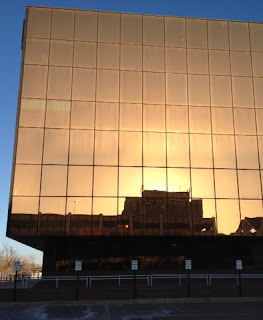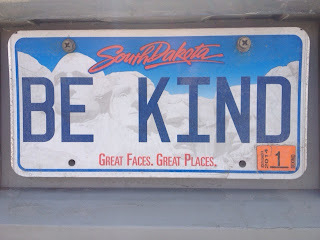surveillance
∞
Bicycles, Handguns, and Cameras
Get Off My Hood!
I just read a post on Facebook about a bicyclist in my town who was struck by someone driving a pickup truck. The driver then yelled at the bicyclist to "get the f*** off my hood" and told him to ride on the sidewalk. The driver is obviously misinformed about our laws, as well as about civility.
The bicyclist managed to take a picture of the driver's face and his truck, but not his license plate, which is too bad.
Packing Heat On Two Wheels
The comments under the photo were especially interesting. I'm not sure if he was joking, but the bicyclist (whom I do not know) said that he often bikes with a .45 in his waistband, which dissuades drivers from treating him with hostility. This time he only had his camera, and he wasn't able to shoot pictures fast enough to capture all the evidence the police would need.
I understand his frustration. Last summer, while biking on an empty street five lanes wide, a motorist sped up behind me, swerved into my lane (I was biking along the shoulder) and yelled at me to "Get on the sidewalk!" then sped off. By the time I had my phone out, he was too far away to get a picture of his license plate. He sped off uphill, making it impossible for me to chase him down.
His recklessness and utter selfishness could have maimed or even killed me had I not safely dodged his oncoming car. His cowardice and lack of regard for my life made me livid.
You Better Outrun My Bullet
But I do not see how a gun would have helped me. Yes, perhaps he would have seen a gun in my waistband, but at his speed he very well might not have seen it. And what would I do with it? I'm not going to start squeezing off rounds at a fleeing motorist; to do so would make me a worse criminal than he. Besides, I was in no state to be handling a weapon: my heart was pounding, adrenaline was shooting through my veins. I was angry, and I was feeling that fright that comes when sudden and severe peril suddenly interrupts a calm day.
I don't want my world to be under constant surveillance, but I'm considering getting a GoPro or some other video camera that would run constantly when I bike on the street. I think if more of us did that, it would be a more effective deterrent than a firearm.
We're In This Together
More importantly, carrying a camera rather than a gun says something about community. The gun is about taking personal charge of one's security, and while I applaud the individual responsibility that implies, the camera insists that reckless driving is not my problem but our problem, a problem that we will deal with as a community, through the structures of law that constitute our community. If you harass bicyclists, I will film it, and I will hand the evidence over to the police.
This is what it means to live in a society that respects the rule of law. We don't live in the time of Euthyphro, who needed to enforce the law himself. We live in the age of the District Attorney; and whatever you may say about an individual D.A., the point of a state-appointed prosecutor is just this: she is the embodiment of our belief that to offend against one of us is to offend against all of us. We are in this together.
I don't want to foster hostility between motorists and cyclists; I want to foster mutual respect. The roads are wide enough to share. If we can learn to do so, we'll all wind up reaching good destinations, together.
*****
Update: Here's a link to an article by Jill Callison about the confrontation between the cyclist and the motorist in the Sioux Falls Argus Leader.
*****
Further Update: Here's a link to a bit of good news: the driver has been charged with several misdemeanors. This is good news for bicyclists, and bad news for hotheaded drivers unwilling to share the road with their neighbors.
I just read a post on Facebook about a bicyclist in my town who was struck by someone driving a pickup truck. The driver then yelled at the bicyclist to "get the f*** off my hood" and told him to ride on the sidewalk. The driver is obviously misinformed about our laws, as well as about civility.
The bicyclist managed to take a picture of the driver's face and his truck, but not his license plate, which is too bad.
 |
| My speedy steed. Please do not hit me. |
Packing Heat On Two Wheels
The comments under the photo were especially interesting. I'm not sure if he was joking, but the bicyclist (whom I do not know) said that he often bikes with a .45 in his waistband, which dissuades drivers from treating him with hostility. This time he only had his camera, and he wasn't able to shoot pictures fast enough to capture all the evidence the police would need.
I understand his frustration. Last summer, while biking on an empty street five lanes wide, a motorist sped up behind me, swerved into my lane (I was biking along the shoulder) and yelled at me to "Get on the sidewalk!" then sped off. By the time I had my phone out, he was too far away to get a picture of his license plate. He sped off uphill, making it impossible for me to chase him down.
His recklessness and utter selfishness could have maimed or even killed me had I not safely dodged his oncoming car. His cowardice and lack of regard for my life made me livid.
You Better Outrun My Bullet
But I do not see how a gun would have helped me. Yes, perhaps he would have seen a gun in my waistband, but at his speed he very well might not have seen it. And what would I do with it? I'm not going to start squeezing off rounds at a fleeing motorist; to do so would make me a worse criminal than he. Besides, I was in no state to be handling a weapon: my heart was pounding, adrenaline was shooting through my veins. I was angry, and I was feeling that fright that comes when sudden and severe peril suddenly interrupts a calm day.
I don't want my world to be under constant surveillance, but I'm considering getting a GoPro or some other video camera that would run constantly when I bike on the street. I think if more of us did that, it would be a more effective deterrent than a firearm.
We're In This Together
More importantly, carrying a camera rather than a gun says something about community. The gun is about taking personal charge of one's security, and while I applaud the individual responsibility that implies, the camera insists that reckless driving is not my problem but our problem, a problem that we will deal with as a community, through the structures of law that constitute our community. If you harass bicyclists, I will film it, and I will hand the evidence over to the police.
 |
| We're in this together. Can we share the road? |
I don't want to foster hostility between motorists and cyclists; I want to foster mutual respect. The roads are wide enough to share. If we can learn to do so, we'll all wind up reaching good destinations, together.
*****
Update: Here's a link to an article by Jill Callison about the confrontation between the cyclist and the motorist in the Sioux Falls Argus Leader.
*****
Further Update: Here's a link to a bit of good news: the driver has been charged with several misdemeanors. This is good news for bicyclists, and bad news for hotheaded drivers unwilling to share the road with their neighbors.
∞
Vertical Art
An article in the BBC today reports that Google's CEO Eric Schmidt wants greater regulation of civilian drones.
If I were more cynical I would imagine that the CEO of a search firm would like to limit civilian surveillance so that searches for visual information has to be channeled through a firm that specializes in searches. Fortunately, I am not very cynical.
Instead, I'm feeling quite charitable. Since I also recently read that piloting a drone is boring work, I think we should start new public art projects for the benefit of those doing surveillance. Until recently, we have viewed ourselves horizontally: we care about how we look from the ground, from eye-level. Maybe we should start to care more about how we look from the bird's-eye-level.
We could start with rooftop art, and move up to something like new Nazca Lines. Then all those drone pilots and satellite image analysts could have something more interesting to look at. Art is good for us. Rather than asking "who is watching the watchmen?" let's ask "what are the watchmen watching?" We should give them something worth seeing. I'm going to start by planting flowers.
If I were more cynical I would imagine that the CEO of a search firm would like to limit civilian surveillance so that searches for visual information has to be channeled through a firm that specializes in searches. Fortunately, I am not very cynical.
Instead, I'm feeling quite charitable. Since I also recently read that piloting a drone is boring work, I think we should start new public art projects for the benefit of those doing surveillance. Until recently, we have viewed ourselves horizontally: we care about how we look from the ground, from eye-level. Maybe we should start to care more about how we look from the bird's-eye-level.
We could start with rooftop art, and move up to something like new Nazca Lines. Then all those drone pilots and satellite image analysts could have something more interesting to look at. Art is good for us. Rather than asking "who is watching the watchmen?" let's ask "what are the watchmen watching?" We should give them something worth seeing. I'm going to start by planting flowers.
 |
| Yeah, but what does the roof look like? |
∞
Surveillance and Virtue
The recent news that a no-fly zone was enacted over the site of the Exxon tar sands pipeline spill in Arkansas is in line with the movement in state legislatures to make it a crime to record animal cruelty, even when it is plainly in the public interest to do so. I recently learned it is a crime to film trains carrying nuclear waste, leading me to wonder how I'm supposed to know what any given train is carrying. So taking a family photo while a train passes in the distant background could be a felony? Bizarre.
These are signs that our technology is racing ahead of us. It is easier to create new machines for surveillance than it is to devise a set of rules for ethical use of those machines. The problem of Google Glass is not something altogether new; but the technology sharpens the ethical issues: can I wear it in the locker room at the gym? Can I wear it while talking with the police, or border guards? Can I wear it at a party where co-workers are drinking?
The problem of drones is similar: we have increased our ability to watch others without being watched. As Foucault observed, this is one of the main functions of the prison, a relatively modern invention. The prison is an architectural technology that allows us to watch over our fellow citizens without having them watch us.
The technology is helpful, and it's not patently evil. Information is power, we are told, and everyone likes power. But we should remember the Ring. The Ring of Gyges, or the One Ring of Tolkien, either one will do; in both stories, the ability to observe while unobserved, this ultimate and total camouflage, is too much power. And there is some truth to the dictum that power corrupts.
We are unlikely to slow our own technological progress, so we must devote equal energy and resources to ethical reasoning and to ethical living. Here is where I suggest we start:
First, if you're ashamed of someone seeing what your community is doing, don't do it. It is one thing to protect trademarked secrets and patented methods of production, to enjoy the economic benefits of one's creativity. But if your reason for concealing your business process is that you know I won't buy your product if I know how it's made, you deserve to be exposed because you are manipulating me by concealing information that would affect my decisions.
Second, devote yourself to respecting the privacy and dignity of others. Do this not just for others, but for yourself. We know ourselves to be less than we wish we were; and we know that the social impulse is balanced in our species by a desire to do some things alone, unobserved, or only in intimate company. To expose those things unbidden is to dominate. It is crass, and unkind. If you do not respect others, the technologies of surveillance will become your Ring, and you will destroy your own soul.
At times these two principles will be in conflict with one another - underscoring the importance of continued ethical reasoning. We can't simply fall back on facile rules. We have got to keep thinking, and thinking hard, together. The simple principles, however, can provide a good place to start: do not attempt to dominate or destroy others. Put positively: love one another.
These are signs that our technology is racing ahead of us. It is easier to create new machines for surveillance than it is to devise a set of rules for ethical use of those machines. The problem of Google Glass is not something altogether new; but the technology sharpens the ethical issues: can I wear it in the locker room at the gym? Can I wear it while talking with the police, or border guards? Can I wear it at a party where co-workers are drinking?
The problem of drones is similar: we have increased our ability to watch others without being watched. As Foucault observed, this is one of the main functions of the prison, a relatively modern invention. The prison is an architectural technology that allows us to watch over our fellow citizens without having them watch us.
 |
| Be kind; love one another. |
We are unlikely to slow our own technological progress, so we must devote equal energy and resources to ethical reasoning and to ethical living. Here is where I suggest we start:
First, if you're ashamed of someone seeing what your community is doing, don't do it. It is one thing to protect trademarked secrets and patented methods of production, to enjoy the economic benefits of one's creativity. But if your reason for concealing your business process is that you know I won't buy your product if I know how it's made, you deserve to be exposed because you are manipulating me by concealing information that would affect my decisions.
Second, devote yourself to respecting the privacy and dignity of others. Do this not just for others, but for yourself. We know ourselves to be less than we wish we were; and we know that the social impulse is balanced in our species by a desire to do some things alone, unobserved, or only in intimate company. To expose those things unbidden is to dominate. It is crass, and unkind. If you do not respect others, the technologies of surveillance will become your Ring, and you will destroy your own soul.
At times these two principles will be in conflict with one another - underscoring the importance of continued ethical reasoning. We can't simply fall back on facile rules. We have got to keep thinking, and thinking hard, together. The simple principles, however, can provide a good place to start: do not attempt to dominate or destroy others. Put positively: love one another.